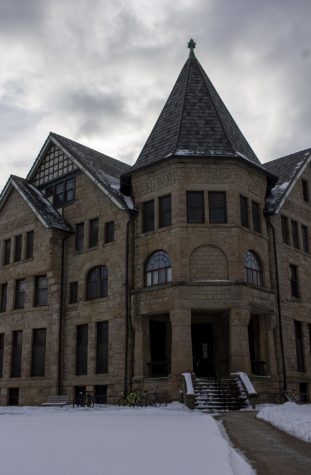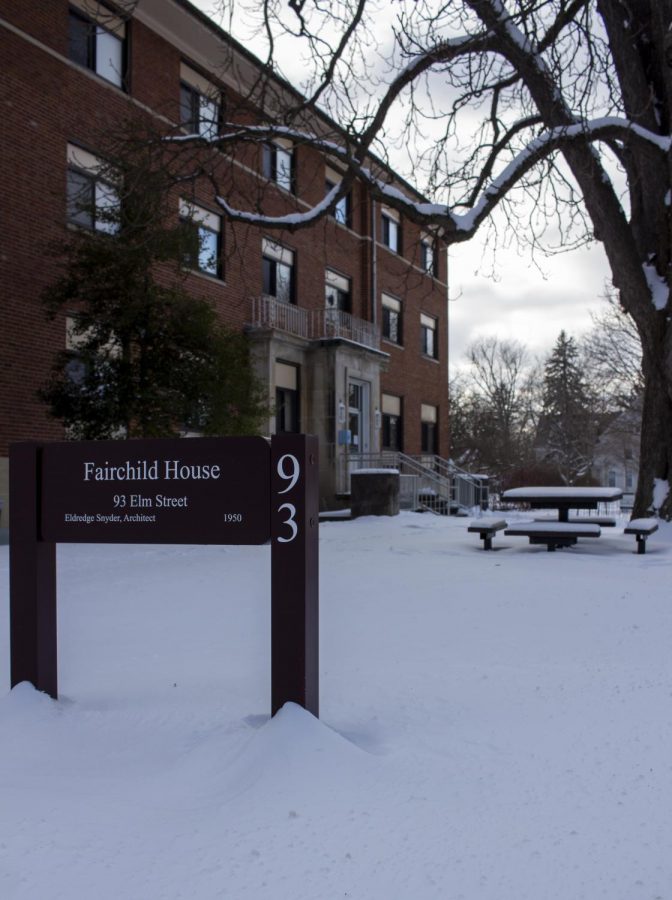OSCA Signs New Rent Contract; Fairchild and Kosher Halal Co-ops Close Their Doors
AVI Fresh will permanently occupy the former Fairchild co-op as the location for the Umami Dining Hall.
After a months-long negotiation between the College and the Oberlin Student Cooperative Association, both parties signed a five-year rent contract in December, introducing a new rent model and transferring Fairchild dining facilities from OSCA to the College. The Kosher Halal Co-op, which is not a member of the OSCA nonprofit, has also been disbanded. OSCA’s negotiation process was complicated both by the pandemic and by the College’s ongoing structural budget deficit.
Because of COVID-19 health precautions, co-ops are not operating during the 2020-2021 academic year. The College’s dining service partner, AVI Fresh, opened dining halls inside three former co-op kitchens. While the College will return Harkness dining facilities to OSCA in the fall, Fairchild Co-op and KHC will permanently close and house the College-run Umami Dining Hall and Heritage Dining Hall, respectively. The new dining halls had previously raised concerns among students that the College was taking steps to shut down OSCA operations.
OSCA representatives spoke to the loss of Fairchild Co-op in a statement to the Review.
“We are disheartened to lose this co-op and disappointed we were unable to close it under OSCA policy with member consent,” the statement reads. “Unfortunately, OSCA is no longer permitted to lease the basement kitchen in Fairchild Hall and as such are unable to continue providing that dining option. … We are disappointed that Oberlin College decided not to lease all of the spaces OSCA operated previous to the pandemic, and are simultaneously resolved to maintain our mission through the spaces available to us.”
Increased Costs
Before the new rent contract was released, some students expressed concern that the College would raise OSCA prices to a degree that would make participation less affordable. The College currently charges $7,316 for the campus dining Gold Plan and $8,600 for College housing. In the 2019-20 academic year, dining in OSCA cost $4,040; a double room cost $5,030; and a single room cost $6,250. Under the new rent contract, OSCA rates rose to a preliminary estimate of $5,050 for dining and $8,326 for housing. These changes mean that OSCA’s dining prices will increase by 25 percent, single-room housing will increase by 33 percent, and double-room housing will increase by 65 percent.
Even with the increased rates, an OSCA dining plan will still cost 44 percent less than the College’s Gold Plan. OSCA housing, however, will only be 3 percent cheaper than College housing. Despite this closing gap between OSCA and College prices, OSCA remains certain that it will continue offering sufficiently reduced prices for students in exchange for their labor in cooking and cleaning.
“We are confident that with the new contract OSCA will still be able to offer lower prices than ResEd and CDS though they will be increased from prior years,” OSCA representatives wrote. “We will continue to offer scholarships for financial and emergency needs. Our community service scholarship will be available as soon as it is safe for students to engage in meaningful service to the Oberlin community.”
According to a Dec. 5 announcement from the OSCA board, the contract also adopted a new rent model that eases the financial burden of OSCA on the College. The 2019 Academic and Administrative Program Review claimed that OSCA costs the College $1.9 million in profits per year. The new rent model allows OSCA to rent spaces from the College according to the number of students enrolled in OSCA, enabling the College to operate any spaces that aren’t in full use by OSCA.
“Under this model, OSCA would purchase a set number of dining and housing exemptions from Oberlin College, which would constitute rent for a given academic year,” OSCA’s Dec. 5 statement to members reads. “The number of exemptions purchased would be determined by the results of the OSCA lottery during the spring semester of the prior academic year.”
OSCA may purchase up to 565 dining and 183 housing exemptions per year. This cap corresponds to the capacity of OSCA facilities and is not otherwise limited by the College.
OSCA Status and College Financial Aid
The College has previously amended financial aid based on enrollment in OSCA, so some students on need-based financial aid receive less funding after enrolling in OSCA due to OSCA’s lower rates. It is still unclear how the new contract will affect OSCA members’ financial aid, which is concerning for students who are still deciding if they should join a co-op. With less than two weeks left to join the OSCA lottery, time is running low for students who need to take financial aid into account when making this decision.
According to OSCA representatives, the College is slated to discuss financial aid next week.
“We are set to meet with the college next week regarding financial aid, where we will find out more information and release it to our community as soon as possible,” OSCA representatives wrote in a statement to the Review. “OSCA members work for decreased rates and make budgetary decisions to get a refund from their fees paid. We are glad that the former policy of reducing financial aid $1000 for dining members and $2000 for housing members will not continue and hope that Oberlin College will consider the hard work done by OSCA members in their policy choices.”
Reduced Kosher and Halal Dining Options
In response to the College’s repossession of the KHC dining facilities in Talcott Hall, students wrote and disseminated a petition outlining the negative impacts of KHC’s closure and calling on the College to support the co-op’s reopening for the 2021-2022 academic year.
In the absence of the Kosher Halal Co-op, the College introduced Heritage Dining Hall, which it advertised as a kosher dining option.
A month into the semester, some students realized that the food in Heritage Dining Hall wasn’t being prepared according to Jewish law.
“In order to call something kosher, you need to pay a mashgiach to make sure it’s kosher,” College fourth-year and former KHC member Paige Reinstein said. “There was no mashgiach, and a month in, students witnessed chicken being served with yogurt, which is against kosher rules.”
Vice President and Dean of Students Meredith Raimondo claims that the College has taken the appropriate steps to ensure that these problems will not persist in the spring 2021 semester.
“It’s really important for students to report concerns promptly — there was only one reported during the fall semester, which has led to a misperception on campus of widespread problems,” Raimondo wrote in an email to the Review. “The kitchen was rekashered before the start of the semester, and has eliminated dairy products in prepared foods. The College is in the process of putting the kitchen under a rabbi’s supervision.”
Some students maintain that multiple incidents were reported to the College. Regardless, without a mashgiach, the food is still not considered kosher. In order to avoid mislabeling food items, the College has now designated certain foods as “kosher-style.”
The College also announced that halal chicken would be available across campus dining facilities. However, in the fall semester, problems arose with food that wasn’t clearly labeled.
“Nothing was really labeled, so no one knew if haram, or forbidden, food — such as soy sauce, vanilla, and some vinegars — were ingredients,” Reinstein said.

The closure of KHC also represents the loss of a unique interfaith community not only on campus, but, according to the petition, in all of North America.
“KHC is the only Kosher and Halal dining co-op in North America,” the petition reads. “KHC brings together religiously observant Muslims and Jews to collectively build a community that starts in Talcott dining hall and continues to be built across the world post-graduation. A dining hall could not provide such an opportunity.”
In her email to the Review, Raimondo wrote that the College intends to provide space for a similar interfaith environment.
“The Office of Religious and Spiritual Life will be offering a pilot program on Jewish and Muslim exchange this semester,” Raimondo wrote. “When in-hall dining is able to resume, such programming will occur in spaces like the Heritage kitchen.”
OSCA also hopes to rely on existing College safe spaces for students of color, women, and transgender students into the future, as its ability to provide OSCA-specific environments may cease moving forward. While OSCA officers are determined to reopen Third World Co-op — a dining community centering students of color — in the 2021-2022 academic year, they believe that they may not be able to ensure the longevity of Third World Social Justice housing or Old Barrows.
The OSCA lottery is currently open for students to join a housing and/or dining co-op during fall 2021. The lottery closes Feb. 17 at 11:59 p.m. Applications for TWC, TWSJ, and Old Barrows can be found at and are due Feb. 11 at 11:59 p.m.







